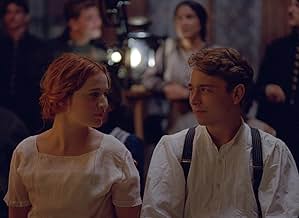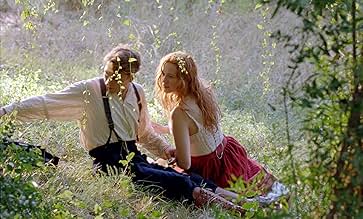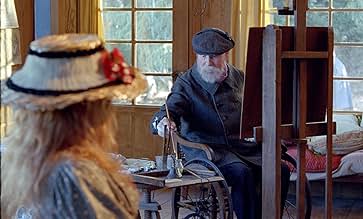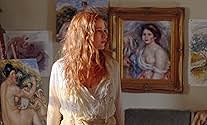Set on the French Riviera in the summer of 1915, Jean Renoir -- son of the Impressionist painter, Pierre-Auguste -- returns home to convalesce after being wounded in World War I. At his side... Read allSet on the French Riviera in the summer of 1915, Jean Renoir -- son of the Impressionist painter, Pierre-Auguste -- returns home to convalesce after being wounded in World War I. At his side is Andrée, a young woman who rejuvenates, enchants, and inspires both father and son.Set on the French Riviera in the summer of 1915, Jean Renoir -- son of the Impressionist painter, Pierre-Auguste -- returns home to convalesce after being wounded in World War I. At his side is Andrée, a young woman who rejuvenates, enchants, and inspires both father and son.
- Awards
- 3 wins & 11 nominations
- La boulangère
- (as Annelise Heimburger)
- Le brocanteur
- (as Thierry Hancisse de la Comédie Française)
- Servante Collettes
- (as Cecile Rittweger)
Storyline
Did you know
- TriviaOfficial submission of France to the Oscars 2014 best foreign language film category.
- GoofsWhen Pierre-Auguste walks in on Jean Renoir being bathed, a modern toggle-style light switch is visible on the wall. The toggle switch wasn't invented until 1917, which is a few years after that part of the film. Earlier light switches were push-button style, and the switch on the wall is also of a modern plastic style that is very much later.
- Quotes
Pierre-Auguste Renoir: You're rather modest for an actress.
Andrée Heuschling: Actress doesn't mean whore.
- ConnectionsFeatured in Fandor: Cannes You Dig It? | Fandor Spotlight (2022)
- SoundtracksShimmy Dédée
By Patrick Artero
Performed by Patrick Artero, Philippe Baudouin, Francis Guero, André Neufert and Michel Queraud
Gille +Bourdos uses the well-known stories of the painter father Pierre-Auguste and the filmmaker son Jean Renoir for a film that is at once breathtaking spectacle and a profound anatomy of the impulses and values of art. The film was one of my highlights at this year's +Palm Springs International Film Festival.
The plot presents the 74-year-old veteran painter (Michel Bouquet) and his ravishing new 15-year-old model, Andree Heuschling (Christa Theret) enjoying their opulent country estate while WW I pounds the humanity outside. Mark Lee Ping-Bin shoots the interiors with classic Dutch light and shadow but the exteriors in the unbridled luminosity of Impressionism. Here Renoir explains that structure comes from colour, not form, and he refuses to use black. That summarizes the painter's Impressionism: it finds reality in what he makes of the outside world, not what it firmly may be. His swirls of rosy chub continues his celebration of the young "velvet" flesh, despite the war's flensing and destruction of the flesh beyond the estate and his age's grotesque gnarl and ruin of his bones. His painting days, like his valiant denial of death, are limited.
Son Jean (Vincent Rottiers) returns from the front with a symbol of the reality his father rejects: an open wound. The family has a variety of open wounds, from the loss of the boys' mother and the favoured model/nanny Gabrielle to the sons' resentment of their father's aloofness. The cut to the bone represents the reality Renoir's fleshy ladies and painted pommes reject. Vincent's convalescence goes beyond the flesh gap to include winning Andree, who -- a closing title tells us -- married him, starred in many films (as Catherine Hessling), and after their split died alone in poverty. The sins of the father don't just visit the son but move in with him.
The tension between the painter's idealized flesh and the its horrific reality are frequently imaged, especially in the eating scenes and in the kitchen where a maid delicately peels a tomato, removing a hide to expose a succulent flesh. The hanging carrion are an implicit reminder of the hunting and killing of the human prey outside. Renoir pere screams from the nightmares he doesn't have his sunshine, models and pink paints to ward off.
Around the story of Renoir pere beats a more subtle story of Renoir fils. Like Andree, the film serves both father and son. Unobtrusively Bourdos weaves in the specific sources of Renoir's cinema. These include his sense that wars shatter natural cross-border fraternities, the harshness of the class prejudices, the increasing disrespect for culture, the necessity for art. Even the quintessential understanding which will become "The terrible thing is, everyone has his reasons." For more see www.yacowar.blogspot.
- maurice_yacowar
- Jan 22, 2013
- Permalink
- How long is Renoir?Powered by Alexa
Details
Box office
- Gross US & Canada
- $2,293,798
- Opening weekend US & Canada
- $65,194
- Mar 31, 2013
- Gross worldwide
- $7,816,573
- Runtime1 hour 51 minutes
- Color
- Sound mix
- Aspect ratio
- 1.85 : 1
Contribute to this page

































